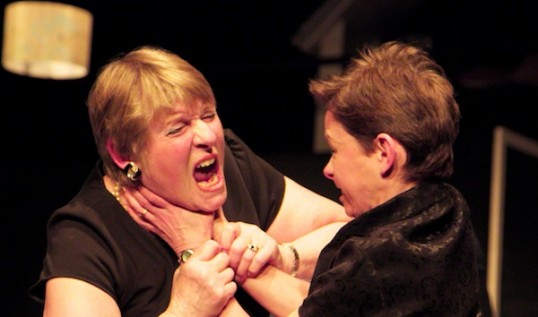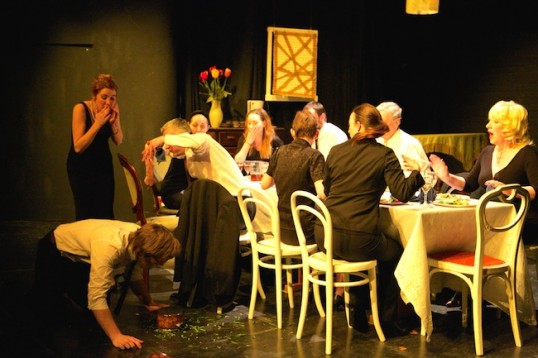August: Osage County
★★★☆☆ Brave attempt
Adam House Wed 14 – Sat 17 May 2014
Some excellent performances and high production values give The Grads’ production of August: Osage County interest and a degree of merit, but overall it can only be seen as a qualified success.

Wendy Mathison (Violet) and Helen Goldie (Barbara) in the Grads production of August: Osage County. Photo © Howard Elwyn-Jones.
In Tracy Letts’ 2008 play, the disappearance of alcoholic failed poet Beverly Weston causes his three daughters and their families to gather at the family home in Oklahoma.
Unfortunately, Beverly’s pill-popping, bitter wife Violet is seemingly set on ‘telling the truth’, which displays all of the cracks in her family’s lives.
The play may have won Tony and Pulitzer prizes but on this showing (the UK amateur premiere) it is not that easy to see how. As it rolls well past the three-hour mark it begins to feel more like an endurance test than anything else.
The subject matter of a family torn apart by resentment and addiction may echo Long Day’s Journey Into Night, but – strangely for a play partly about poetry – there is little that is poetic on display. Nor is there much mining of profound truths.
Instead, the huge parade of different characters (not all of whom seem dramatically necessary) and melodramatic atmosphere give it more of the air of a horribly stretched out soap opera. Billing the play as ‘darkly comedic’ does not really help either; the laughs are few and far between.
None of this is the fault of the cast, who put in some fine performances. Wendy Mathison is particularly powerful, dominating the stage as the spiteful matriarch Violet Weston. She is so dominant, in fact, that the production becomes somewhat unbalanced. With the exception of Beverly Wright (Vi’s sister Mattie Fae), the cast do not quite match Mathison’s levels of energy and power. Some of the other actors are accomplished, and everyone deserves praise for keeping standards up over such a gruelling piece, but the absence of huge performances able to go toe-to-toe with the horrendous Vi is a drawback.
The melodramatic nature of the piece also means that there is a definite lack of subtlety at times. In such a long play, the absence of light and shade – everything is either flat or hysterical – becomes wearing.
“a considered, sympathetic performance”
It is a shame that Richard Godden’s Beverly only appears in the prologue, as his quietly-spoken, ominous performance is extremely satisfying. Helen Goldie (Vi’s daughter Barbara) rises well to the challenge of confronting Vi verbally and physically. Cari Silver (Barbara’s sister Ivy) also turns in a considered, sympathetic performance, while Lindsay Terrell, as the third sister Karen, is more successful than most in locating the comedy in the piece.

“An oddly distancing effect” in the Grads’ production of August: Osage County. Photo © Howard Elwyn-Jones.
Klara Rohel is entirely believable as Barbara’s confused, self-obsessed teenage daughter Jean, while Robin Thomson brings a befuddled, dignified charm to Mattie Fae’s put-upon husband Charlie. Laurence Wearing is suitably sleazy as Karen’s fiancé Steve, while Alan Patterson manages just the right combination of narcissism and self-righteousness as Barbara’s husband Bill.
Wendy Brindle has enviable stillness and self-possession as Native American home help Johnna, while Richie Russell brings a crumpled likeability to Mattie Fae’s ‘loser’ son Little Charlie. Kenneth Brangman’s softly spoken Sheriff Deon has a quietly effective presence. Although some of the cast are clearly more at home than others with the required accents, the standard remains fairly consistent.
David Grimes’s direction cannot be faulted for its attention to detail or ambition. However, sometimes this ambition seems to have been carried too far – the hugely complicated multi-level set seems inappropriate for this particular venue, as it slows the action down at times and can make it hard to see what is happening.
Having a dinner that is as apparently realistic as possible, featuring many of the cast obscured from view, actually drinking and eating, has an oddly distancing effect. Similarly, the use of a flashing light and appropriate sound to simulate a TV may be another attempt at realism but ends up just being distracting.
The play is bookended by quotations from TS Eliot’s The Hollow Men. This might be seen as an attempt to lend some borrowed profundity, but stating at the opening that ‘life is very long’ should let us know we are in for a hard slog. No reflection on cast and crew, whose unstinting efforts do them credit, but the 3 hours 35 minutes did not exactly fly by.
Running time 3 hrs 35 mins including 2 intervals
Run ends Saturday 17 May 2014
Evenings 7.00 pm
Adam House, 3 Chambers Street, Edinburgh EH1 1HR
Details at: www.egtg.co.uk
The script of August: Osage County is available to buy:
Click on the above image to purchase through Amazon.
ENDS






















Comments (2)
Trackback URL | Comments RSS Feed
Sites That Link to this Post